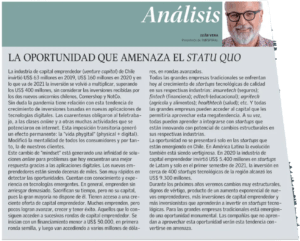The venture capital industry in Chile invested US$ 63 million in 2019, US$ 160 million in 2020, and so far in 2021, investment has multiplied again, surpassing US$ 400 million, not including the investments received by the two new Chilean unicorns, Cornershop and NotCo.
Undoubtedly, the pandemic is related to this trend of increasing investments based on new applications of digital technologies. Lockdowns forced telecommuting, online classes, and many other activities that were boosted on the internet. This temporary imposition generated a permanent effect: the phygital life (physical + digital). It changed the mindset of all consumers and therefore, that of our clients.
This change in mindset is generating countless online solutions to problems that today find a better response thanks to digital applications. The new entrepreneurs are numbering in the tens of thousands. They are very quick to spot opportunities. They have knowledge and experience in emerging technologies. Generally, they undertake without risking too much. They sacrifice their time, but not their capital, as the vast majority do not have it. They have access to a growing supply of venture capital. Many start, but few succeed in advancing, growing, and being successful. Those who do succeed access successive rounds of venture capital. They start with less than US$ 50,000 in funding, in the first seed round, and then access several million dollars in advanced rounds.
All large traditional companies today face the growth of quality technology startups in their respective industries: InsureTech (insurance); FinTech (financial); EdTech (educational); AgriTech (agricultural and food); HealthTech (health); etc. And all large companies can access the capital that would allow them to take advantage of this megatrend. In turn, all can learn to integrate with startups that are innovating with the potential for structural changes in their respective industries.
The opportunity will not only arise in the startups that are emerging in Chile. In Latin America, the evolution is also dizzying. In 2020, the venture capital industry invested US$ 5.4 billion in Latin American startups and in just the first half of 2021, investment in nearly 400 technological startups in the region reached US$ 9.3 billion.
Over the next few years, we will see very structural changes, worthy of vertigo, as a result of an exponential increase in new entrepreneurs, more venture capital investments, and more investors learning to invest in technology startups. For large traditional companies, a monumental opportunity is emerging. Companies that do not learn to seize this opportunity will see this trend become a threat.




